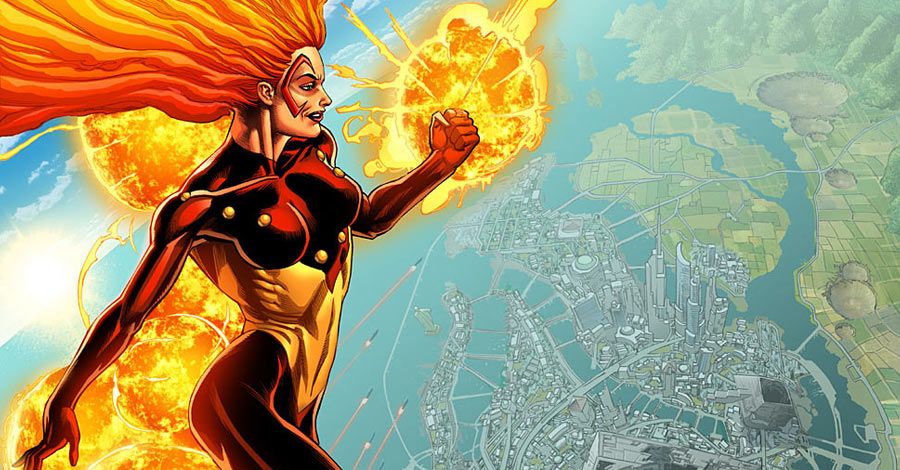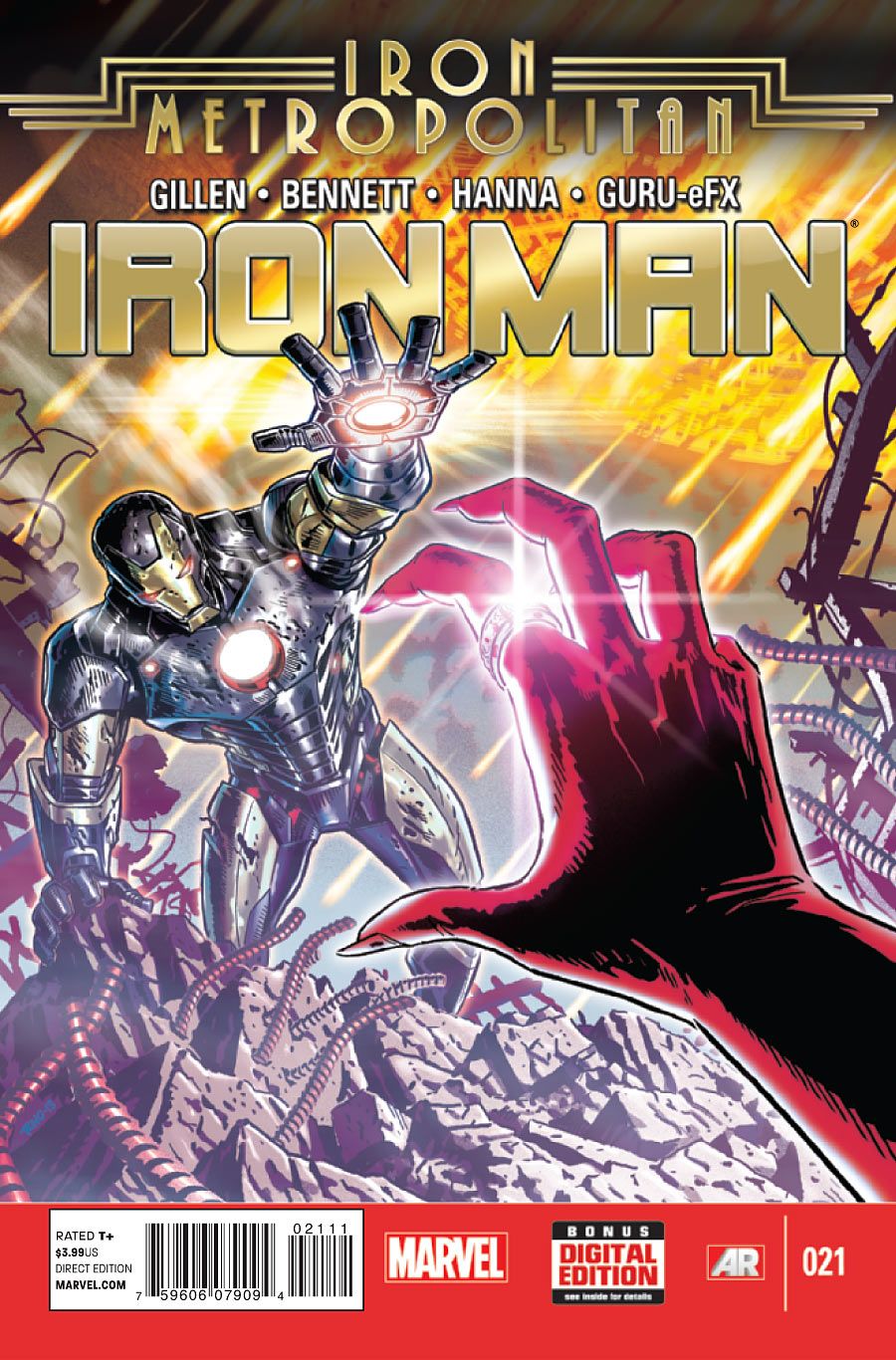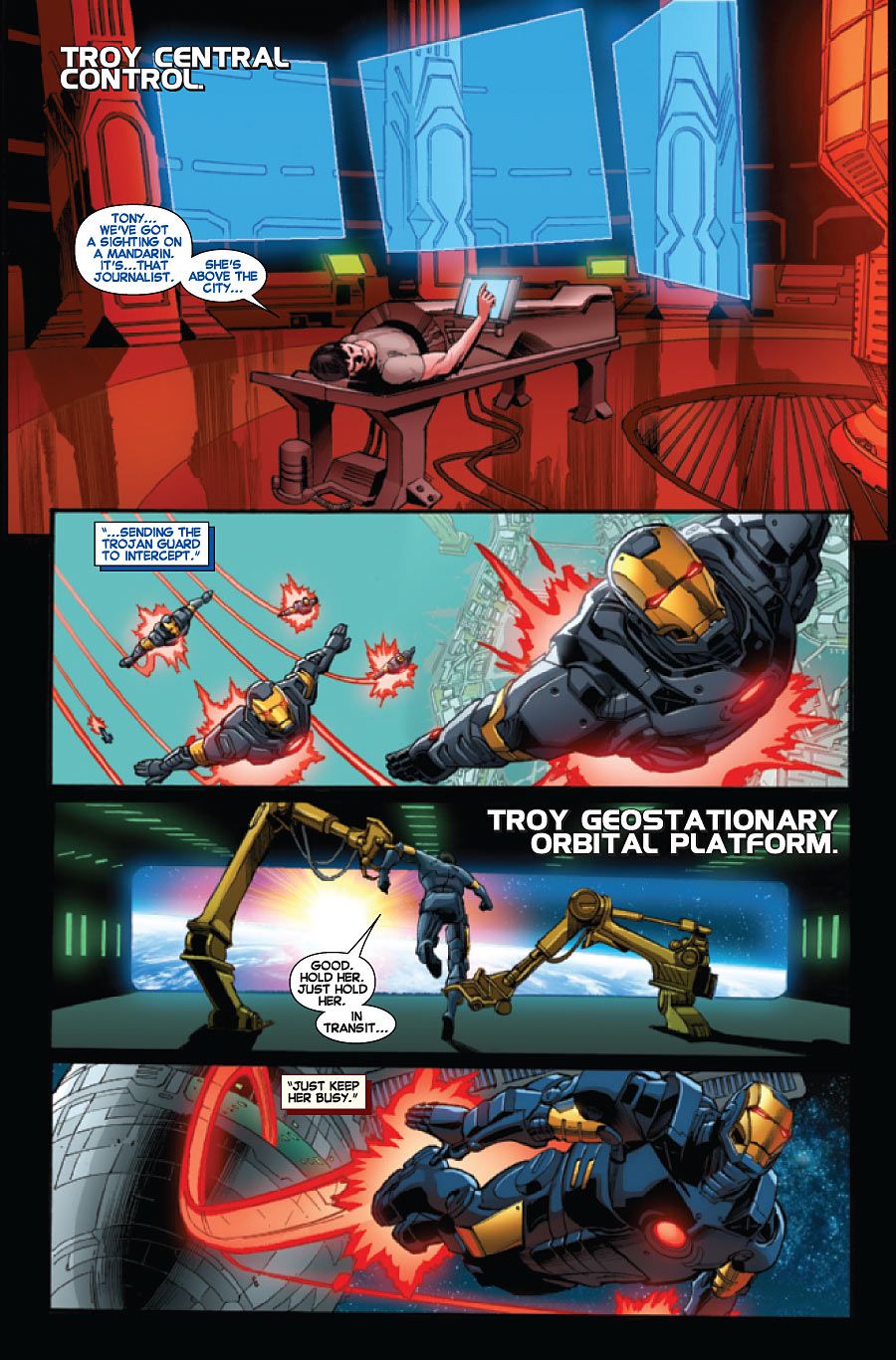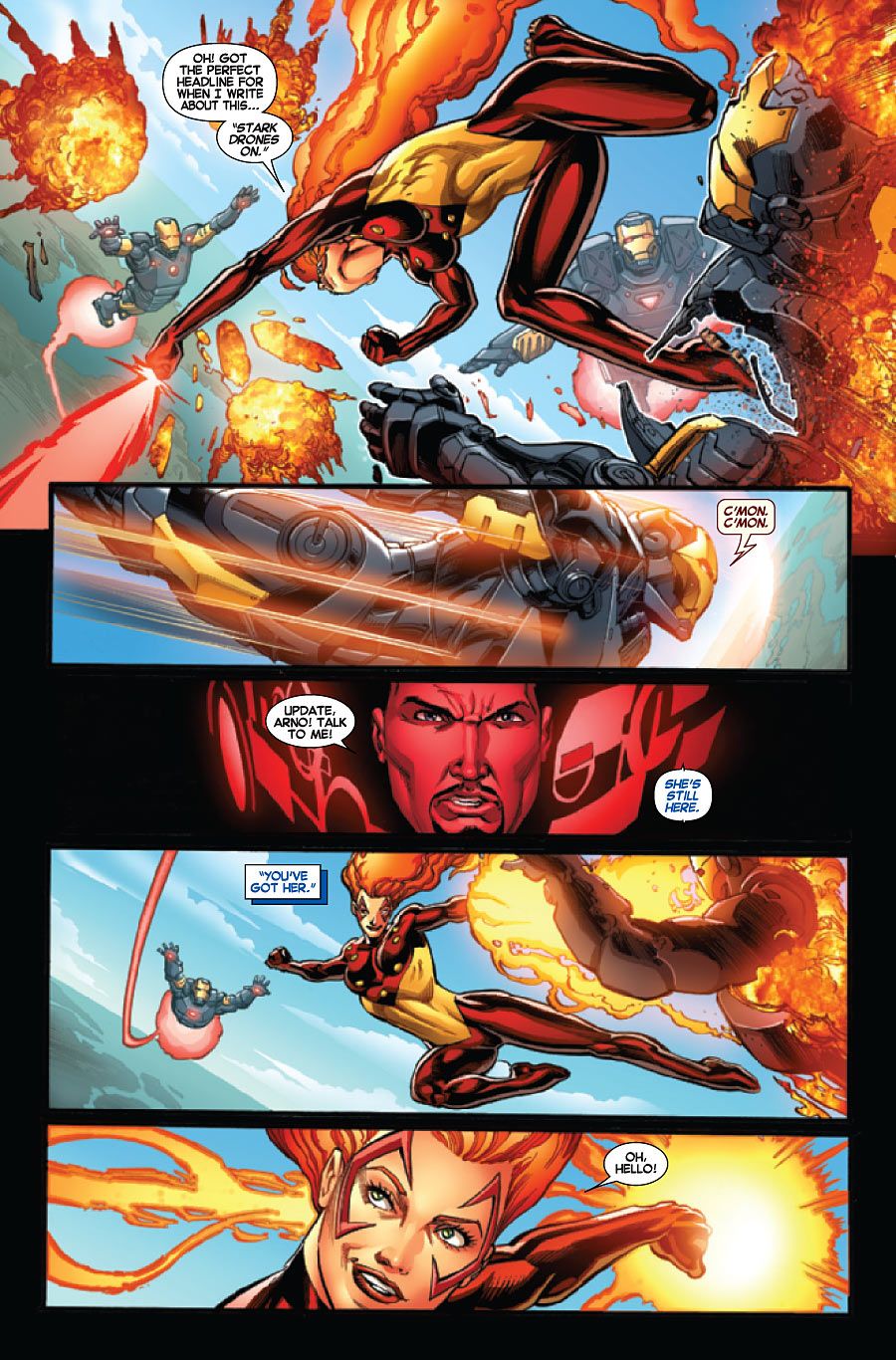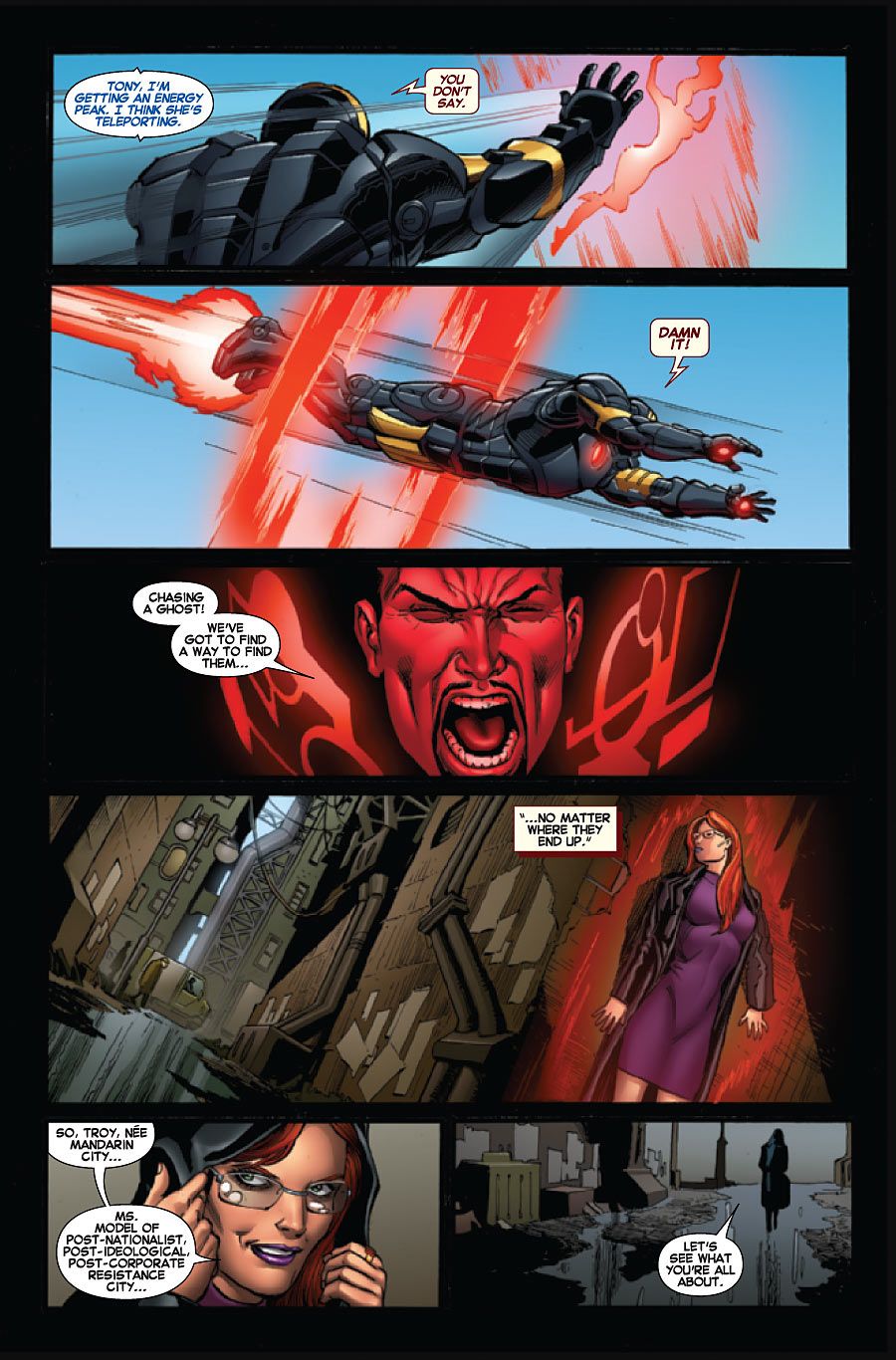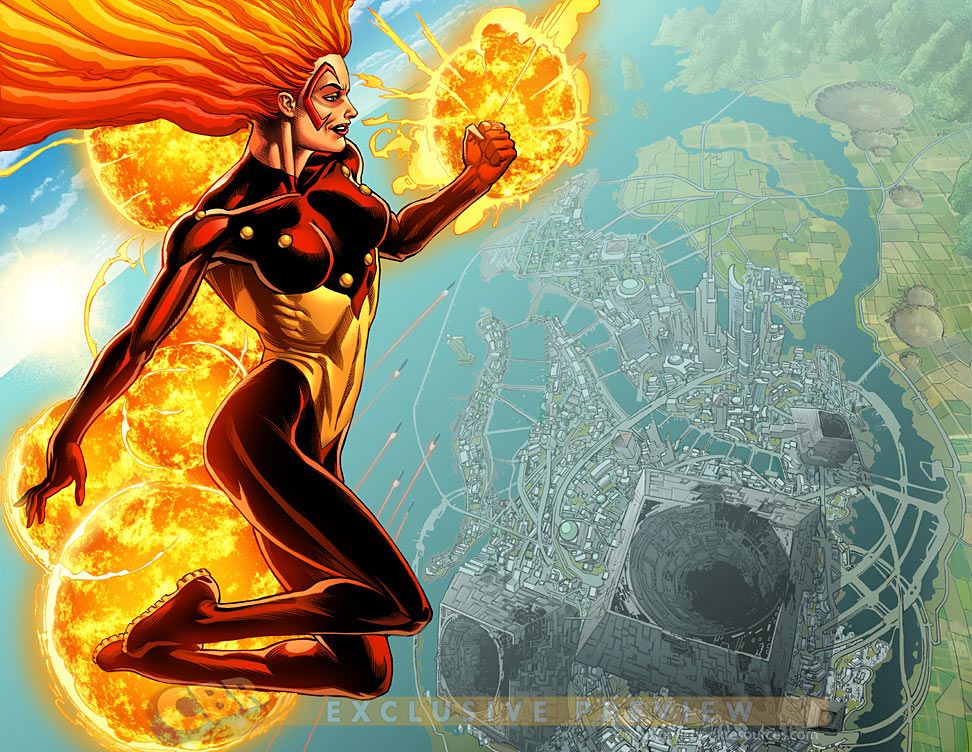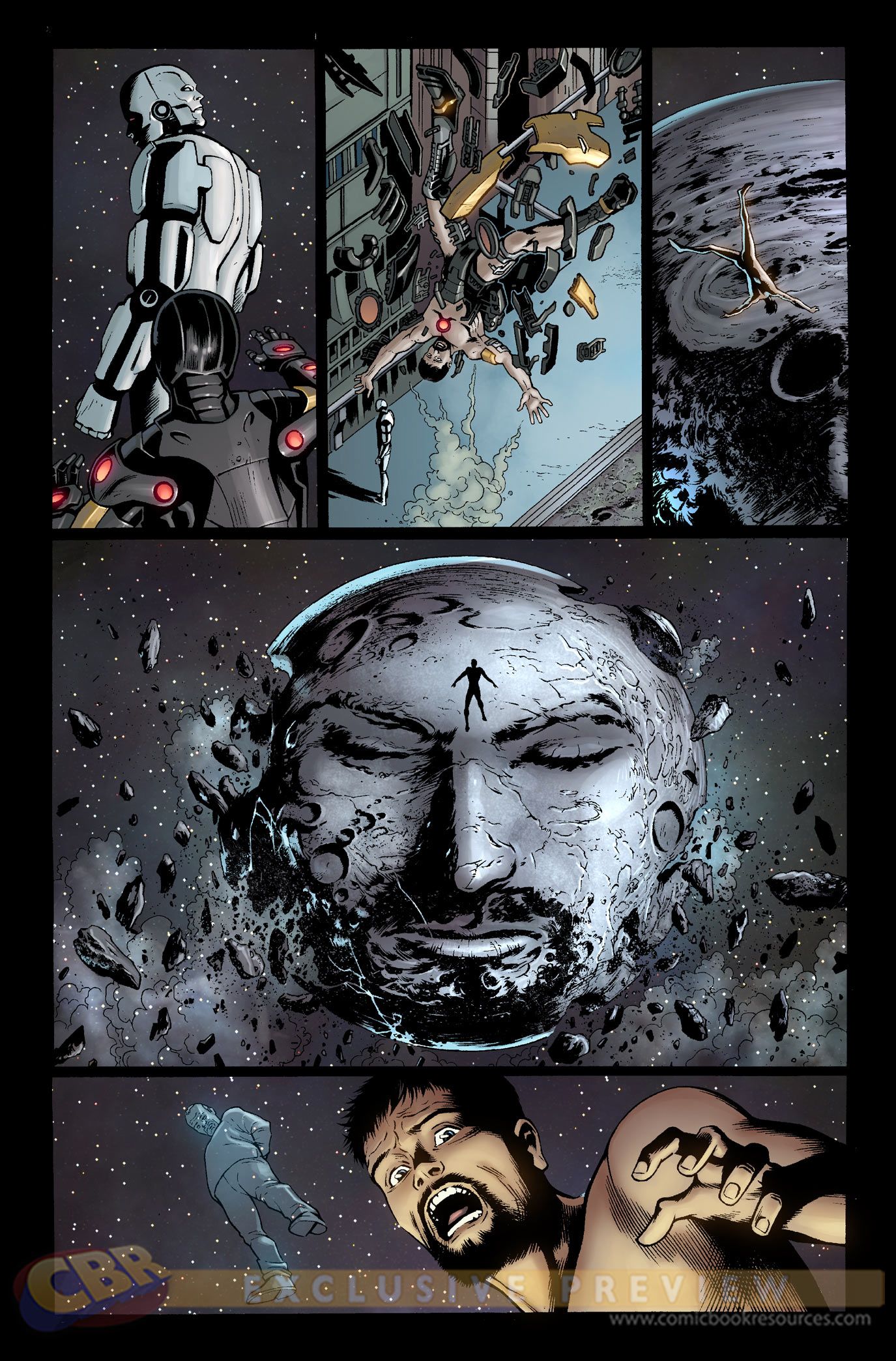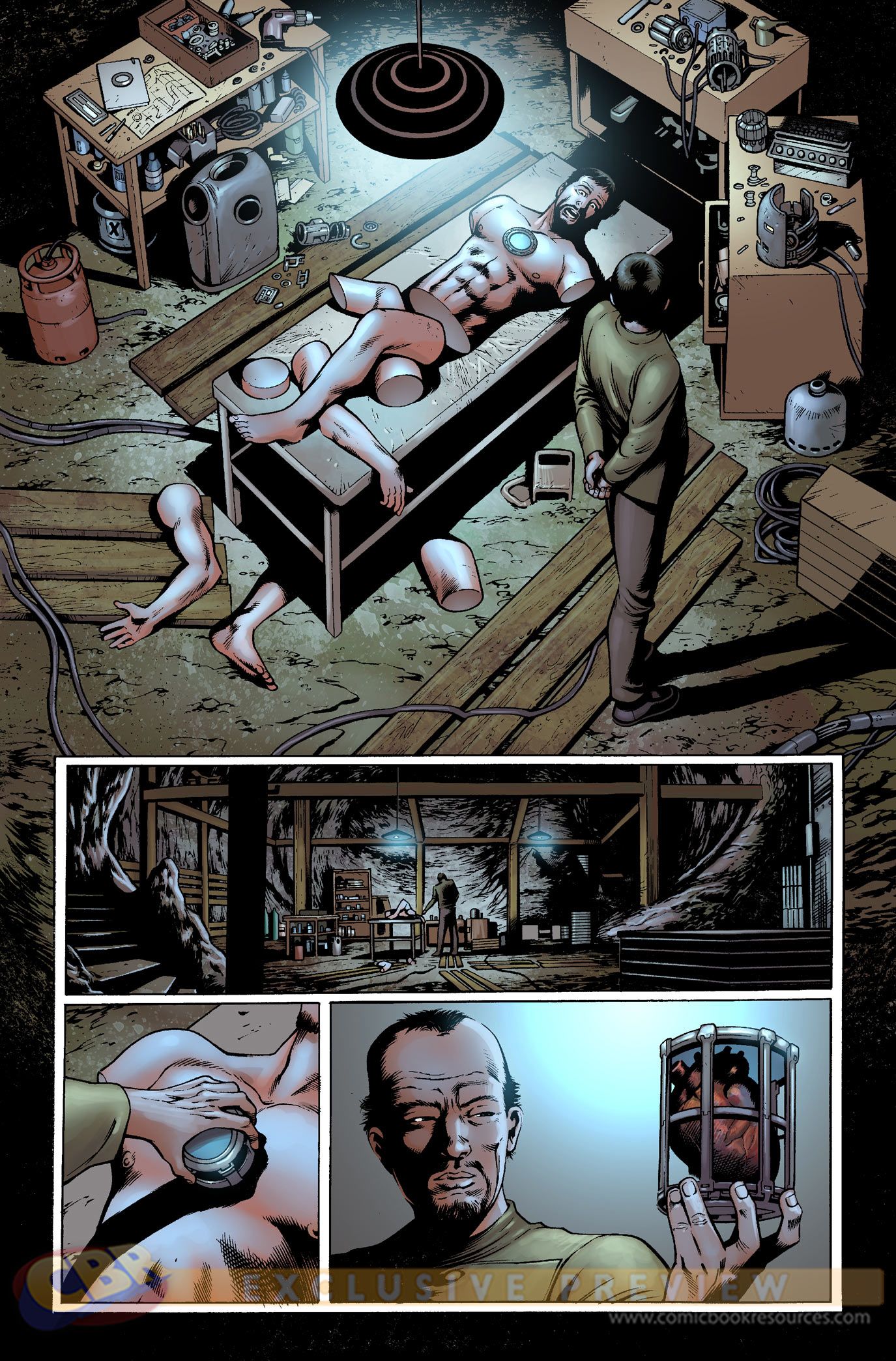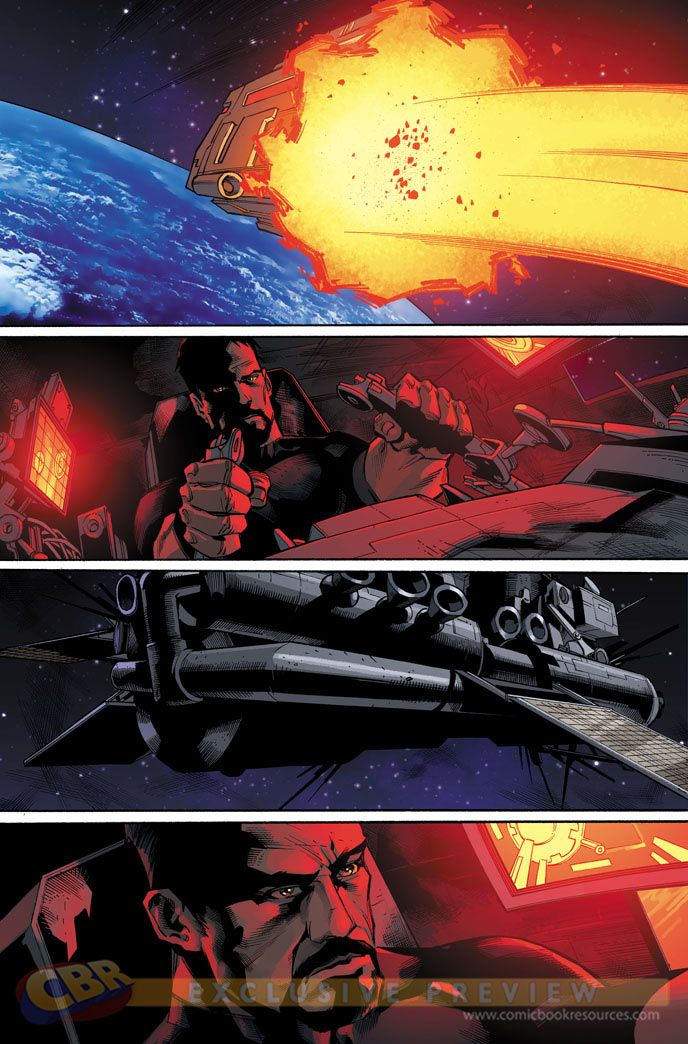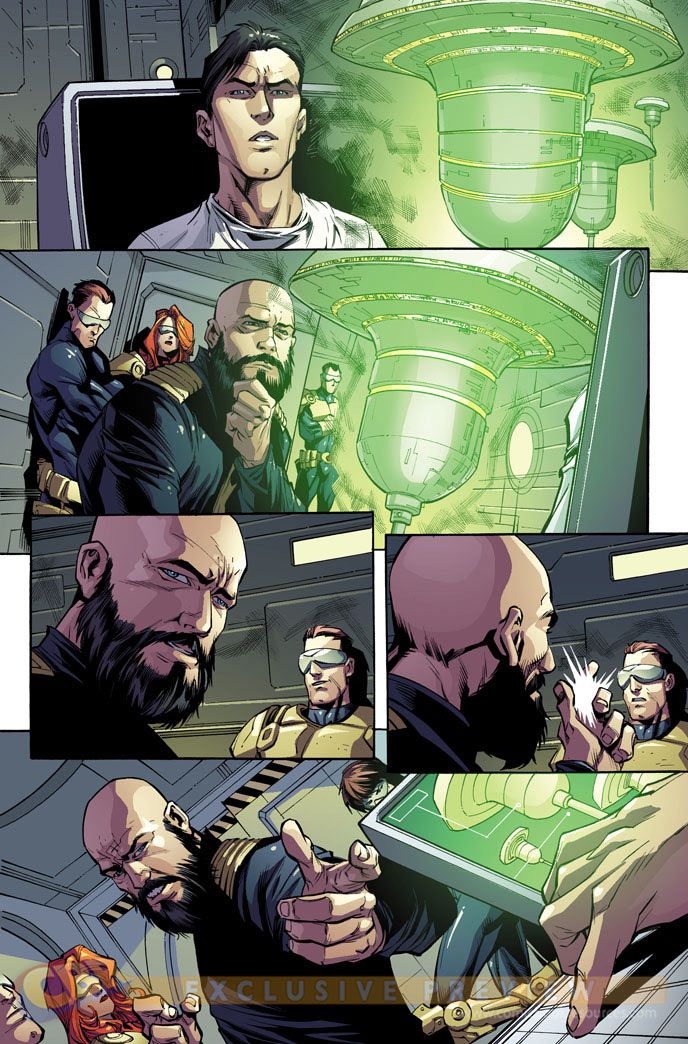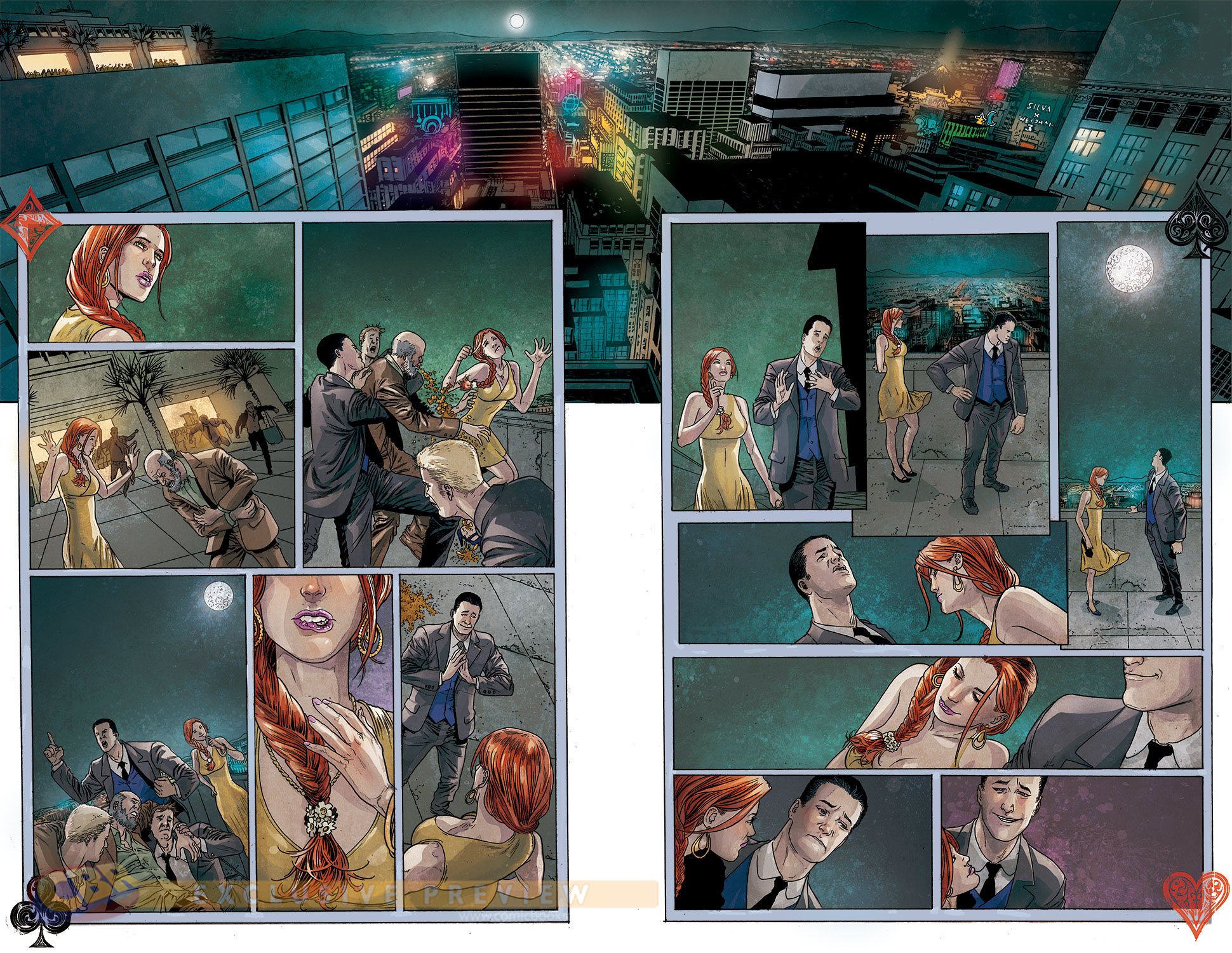In "The Future," the final story line of writer Matt Fraction and artist Salvador Larroca's run on Marvel Comics' "Invincible Iron Man" series, Tony Stark's longtime arch-enemy, the Mandarin, finally met his maker. Had you asked him then how he felt about the villain's death, Tony would have expressed some relief. These days, however, he might be missing his old foe. In "Iron Metropolitan," writer Kieron Gillen and artist Joe Bennett's current arc of "Iron Man," Stark is not just facing one foe -- he's facing ten of them in the form of the Mandarin's sentient rings and the people they've selected to harness their powers.
Gillen's "Secret Origin" Redefines "Iron Man's" World
How will Iron Man stand up to their assault and protect the futuristic city he and his brother Arno Stark are attempting to build on the ruins of the Mandarin's former metropolis? And how will Tony's recent adventures on the moon during the "Iron Man: Fatal Frontier" Infinite Comic impact his endeavors on Earth? For the answers to those questions and more CBR News spoke extensively with Gillen about plans for both "Iron Man" and the series' upcoming Annual.
CBR News: Kieron, let's kick off by talking about one of the biggest developments in "Iron Metropolitan," the emergence of the Mandarin's sentient rings. It seems to me that by tackling the legacy of the Mandarin in this way you're honoring what Matt Fraction did before you by keeping the actual Mandarin dead and picking up the idea that the rings house the consciousness of sentient beings. Is that correct?
Kieron Gillen: In short yet, yes. [Laughs] There's a kind of question in Matt's run as to whether or not the Mandarin was just delusional. Maybe there's nothing inside the rings at all? It all could be lies. Everything the Mandarin did had question marks over it, but I like the idea and alien technology and artificial intelligences are kind of recurring themes to my work.
So the idea of these sentient rings struck me as great fun, and in the latest issue which ties into "Inhumanity" is the first time we get to see some of the rings' politics. That's an interesting and unique problem for an artist; trying to make 10 rings emote. [Laughs] So we were building up some of the things Matt put in play, playing with some of my ideas, and building towards something else. The rings are clearly acting in a different way than they did before.
Can you talk about what drives the rings? Are they essentially out to get Tony Stark? Or are their motivations more political in nature? Are the rings alien terrorists out to destabilize Earth?
Those are all good questions. Some of the actual truth of what they're doing and why will kind of come out toward the end of "Iron Metropolitan." The Liar Ring, though, has been concerned with things like "escalating terror." So there's definitely an outside context, but in terms of what they're doing and why they're choosing these people specifically is an open one and you get at least a preliminary draft of an answer by the end of "Iron Metropolitan."
The next arc is titled "Rings of the Mandarin" so this is clearly a major plot going forward in "year two" of my "Iron Man" run. It's quite a fun device in you have these ten rings with different power sets that go to different people. You see who's going to get what ring. Some are new people. Some are people we know. I trust a lot of them will be surprises. They're not all traditional Iron Man characters.
So far the primary focus of the Mandarin rings' attack has been to destabilize Tony's attempts to transform Mandarin City, a project in which he's being assisted in by a number of people. Let's talk about them starting with Arno Stark. You seem to enjoy writing Arno and he appears to play a number of roles. He is of course a sounding board for Tony's ideas, but is he also a mission control and an Alfred Pennyworth-like character in that he's Tony family and enjoys a bit of verbal sparring with him?
These are two phenomenally smart men, and Arno, for a man who spent a lot of his life frustrated, at least at the moment, seems happy to have what he has. He's aware of his limitations and how people treat him. He likes being useful. He likes being able to put his ideas into practice.
So yes, he's very much like DC Comics' Oracle in some ways, I suppose, in that he's basically Tony's support as well. And now the idea that he has family changes things for him. He and Tony are still trying to define their relationship. They're both frighteningly smart and whenever you get two frighteningly smart people together there's a degree of head butting. Plus Arno and Tony aren't the most compliant human beings. So some of their arguments are for the sake of arguing.

There are of course still questions about who Arno will be. He's got his own personal history and issues and Tony is still dealing with the fact that he's adopted. We say pretty explicitly in the story that he's not processing some of this stuff yet. The demarcation of the relationship between Tony and Arno is one of the really big elements of year two. At the moment they're very much in the honeymoon period.
Anyone who knows an Arno Stark was the Iron Man of 2020, including Tony, has a sense of "that guy wasn't very nice!" [Laughs] So there's a sense of possible dread to it, but at the moment they appear to be on the same page. Arno has joked that he looks more like a super villain. Because of the way society tends to stereotype people with disabilities Arno knows that people like him don't get accepted as a hero as often, which is obviously abominable. You've got to presume that in the same way Tony and Bruce Banner -- and Tony and really any of the genuinely smart people in the Marvel Universe -- eventually find something they don't agree over, that there will be something Tony and Arno don't see eye to eye on.
Helping to sell the idea of Tony and Arno's new city to the public is Pepper Potts' fiance, Marc. Where did your idea for Marc and his profession come from? What inspired his creation?
Marc is actually inspired by a couple people I know. In the "Annual" we'll get some stories about how he and Pepper met and how they hit it off, and I wanted somebody who was in Pepper's life but not directly involved in the super hero part of it. He's somebody who works on a lot of things in the Marvel Universe, but he's an outsider. He's in deeply over his head when it comes to the events of this story.
He's also very competent. He's very good at what he does. It's just that this is so far out of what that usually is. So he's viewing this world in a very different way and he's quite useful from that view point. At the same time, he's the ex of our new villain Abigail Burns the Red Peril. So there's that human contact there too, which is also quite fun.
PR people kind of get a bad wrap, so I thought it might be nice to have a guy who is inspired by a lot of the thoughtful, progressive and wanting to do good stuff in the world PR people. That's Marc. He puts all that stuff to practice. In the Annual we get a bit more about his motivations and what really drives him.
The sadly departed Kate Kildare from "The Order" and the X-Men books did a meta human PR thing, which was quite fun and interesting. The idea of having someone enter that world and become a Kate Kildare was certainly appealing.
Another ally assisting Tony is the former P.E.P.P.E.R. and now H.E.L.E.N. A.I. What has this A.I. become to Tony? And does he care about her simply because she reminds him of his friend Pepper Potts or does he genuinely appreciate H.E.L.E.N. for what she is?
By renaming her H.E.L.E.N. he's treating her like Pepper Potts in that he's given her a promotion. Pepper Potts wasn't always the CEO of Stark Resilient. P.E.P.P.E.R., the A.I., was essentially his assistant for his entire space adventure and she did a really good job. Now he's back on Earth and clearly there's an affection towards her as program. He thinks, "I'll give her a life of her own and set her free to work for me in a more important position."
Of course you could look at that in a more cynical way and say, "Maybe it's just Tony looking after a proven robust A.I." Is he just being practical? I think it's a bit more sympathetic. He's clearly giving her the mandate to call him on his crap. There's an argument to be made either way.
Could you look at Pepper's engagement and how Tony treats the P.E.P.P.E.R. AI and possibly infer some creepy things?
There was always something a little creepy about the P.E.P.P.E.R. A.I, which was mentioned in the first panel she appeared in. [Laughs] She argued against it. Tony meant it as a complimentary gesture and despite being inspired by Pepper it's not based on her. It's not like Tony copied her brain. It's more like he made a portrait in the same way I might write a short story describing my wife or you. Tony making an A.I. out of you is the same thing. He's making an interpretation or copy of you. That's kind of more what P.E.P.P.E.R. is to Tony.
EXCLUSIVE: Ewing & Gillen Explore Iron Man's "Fatal Frontier"
To set up his plans for Mandarin City Tony first had to neutralize its criminal element. He played sheriff in the recent "Fatal Frontier" Infinite Comic you co-wrote with Al Ewing and here again we find him in the same role. Looking back a little further, this is not the first time he's been a law enforcement agent; he also ran S.H.I.E.L.D. for several months. Is this coincidence? Or do you think there's a genuine part of Tony that really enjoys law enforcement work?
I think he pushes and pulls between being this authority figure and this "the rules don't apply to me" figure. There are times when Tony thinks he's above the law and there are times when he wants to embody the law, and I think the push and pull between the two is a very Tony Stark-style dilemma.
I agree him having a mandate over two cities in recent times, the moon colony in "Fatal Frontier" and Mandarin City in "Iron Metropolitan," is an interesting parallel. That's kind of the key of one of the stories we do in the Annual, which has three stories. Instead of doing just one big one I thought, "Let's do a series of stories inspired by the concept of the moon and bring all that stuff back into the main book."
The first story is kind of about that. It's kind of "A Tale of Two Cities" in terms of a final confrontation between Udarnik the Shock Worker and Tony because at the end of "Fatal Frontier" Tony thought he had gotten rid of all of the Phlogistone and he hasn't. The story starts with Tony realizing that there are some trace elements within him and they'll get him in the end.
Al was kind of the primary architect of the "Fatal Frontier" stuff. The concept and some of the larger structure is mine, but in terms of the vast majority of the execution it's very much Al. There's so much of that stuff I want to bring back into the book. Whenever I finish what this run will be I think "Fatal Frontier" will be considered part of it.
So yes, the idea of Tony playing sheriff is an interesting idea. Especially since he's decided he wasted so much time and wants to do all of this stuff. The idea that he wants to step up is another thing that came out early in my run and you can kind of see it across the whole Marvel Universe especially in the Avengers books.
Are you able to reveal the chronological order of when "Fatal Frontier," the Annual and "Iron Metropolitan" happen?
It's complicated. [Laughs] The entirety of "Fatal Frontier" happens before "Iron Metropolitan." So when we start "Iron Metropolitan" it's some time after he got back from space. Tony and Arno have been working on these plans together. Plus, when we started "Fatal Frontier" he was in his space armor. At the moment I'd rather not say where the Annual happens in the timeline though.
What can you tell us about the remaining chapters of "Iron Metropolitan?" In terms of plot what are they about?
There is a climax and we see the ring bearers come to bear upon this, no pun intended. The one who's been blowing stuff up, the bearer of the Remaker Ring, we still don't know. That person clearly has some kind of scheme and that reaches its climax in this enormous, ridiculously epic conflict. It's very exciting. It's one of my favorite action sequences I've done so far in the comic. What Joe [Bennett] did in the final issue of the arc is pretty impressive in terms of like getting a lot of space to do some interesting things and this is a real Marvel Universe battle, which is exciting. There's these incredible city-wide destruction scenes.
We also get some journalism at last. The one thing about "Iron Metropolitan" is I've not said what the city actually does. [Laughs] It's the city of the future and you've seen the security systems and the central stuff, but we don't really know what the idea of the city is. So the next issue we get Red Peril researching the city. I get to be "Transmetropolitan" Warren Ellis for a few pages and we get to see what the city is used for. Then there's an enormous uprising and the future of the city is decided, involving the Mandarins who we've introduced so far. We don't introduce seven new Mandarins in two issues; so there is a slow burn on that plot, all very much come to the front.
Are you having some fun twisting the conventions of DC Comics' Green Lantern on its ear with the Ring Bearers?
It's fun. The rings don't really like each other and the bearers aren't in agreement on what they choose to do as will become increasingly visible as we continue.
There's always been something creepy about aliens arriving on Earth and giving somebody a weapon. It's like, "I'm not sure you get to do that, strange alien species." And there's a question of why they chose these people? So who do you answer to? Why are you interfering with our culture?
I don't want to give away too much because this is where we end up progressing in the story, but we're riffing on a bunch of stuff with the Mandarin Rings. It's kind of a major trope, this idea an alien giving humans a weapon. I'm taking that seriously as politics. Why on Earth would people give weapons to a culture?
You touched on Joe Bennett's artwork already, so what can you tell us about the artists working with you on the "Iron Man Annual?" What do they bring to each of the three stories?
Alvaro Martinez does the aforementioned "Two Cities," where we get the links between Tranquility Gulch and Troy made explicit. He's just got a real coolly atmospheric and clean line, which gives the space-city an almost Dan Dare-esque quality (which really helps when romance of space and the death of that dream is kind of what the whole arc was about). He also really makes Udarnik the Shockworker become a real solid character. "Orbital" is by Agustin Padilla, who also did the "Inhumanity" issue. It involves Eli's New Modernist Army and -- well, shall we say a meeting? I wrote the story as my hard-sci-fi Warren Ellis tribute, all 2001 panelling, but Agustin takes it in a different way, turning it into something with much more energy and Marvel Universe glamor. The final story, "By Moonlight" is by Marcos Marz, who just does some incredible structural things with the page. He takes the three scenes, and makes them individual entities and -- oh, I don't really want to give it away. It's just really beautiful, and makes each scene feel like its own place. When it's got that romantic edge to it, that really is key.
Then finally, we know your next "Iron Man" arc brings two of your favorite genres, fantasy and science fiction, crashing into each other, which is something you don't often see. Why do you think that is?
It's weird. On average I would say the Marvel Universe is a science fiction universe. There's magic in it, but at its heart it leans toward science. Even its cosmic stuff leans toward science. There's a difference between The Power Cosmic and magic. Its philosophy leans toward the star children and gods and space mysticism, which is essentially science overstretched, as opposed to magic which is a fundamentally different system. Now if you want to flip that around for a second, magic is a lot more important in the DC Universe in terms of its fundamental character.
Anyway! There's always a kind of frisson and it's not always a good frisson. The reason I want to do this is it's a way to pick up some plot lines I played with earlier. Going all the way back to issue #4 we had someone trying to use science to make a host for a Lovecraftian Cthulhu-like clone baby. That's the kind of approach I'm digging into here. It's like the application of science in magic and magic in science.
Malekith Seeks the "Rings of the Mandarin" in Gillen's "Iron Man"
There's a bit early on in the next story line where our villain, Malekith, flips things and magic becomes indistinguishable from technology. In "Thor: The Dark World" there's that moment where they're basically talking about the quantum bridge and the difference in language between how Asgardians would describe the quantum effects and how the Earth's scientists would. There's a kind of nod toward "aren't these Asgardians silly." That's kind of a comedy beat. I think it's a failure of perspective. How two different people describe the same effect doesn't involve one of them being silly, especially if they're better at it then you are.

So I'm playing with that. This is a story about the boundary between science and magic and all those questions. There's a lot of relevant stuff between elves and humans; especially elves and Iron Man. Elves hate iron so symbolically Malekith would go after Iron Man. Magical characters tend to be symbolic thinkers. There's also the fact that elves famously steal children; the changeling myth. That feeds really well into the Tony Stark is adopted plot. All these different things work together thematically and in terms of style.

The core of the story is basically Tony Stark doing a black ops mission into the Dark Elves' realm of Svartalfheim. That's the structure; Tony in a slightly modified suit doing a mission. So despite the fantasy setting this is quite a hardboiled Wildstorm Universe-style story. It feels like an SAS mission.
There's a lot of culture clash. The character of Dark Angel, who I've been writing in the "Revolutionary War" event, is Tony's tech support. She's his magical advisor because how she thinks about magic is a lot more in line with how Tony thinks instead of somebody like Doctor Strange. Tony would want somebody he was comfortable with; someone who could explain magical phenomenon to him in a way that makes sense to him as a scientist.
The arc is also about the escalation of the war with the Mandarin rings and it's Tony versus Malekith, which is fun. It leans heavily into what Jason Aaron has been doing with Malekith and the Dark Elves in "Thor: God of Thunder." Jason is doing some great stuff there. I told him I was thinking of doing a Malekith story and then realized that it was going to start about month after he finishes his Malekith story. So it's one of those bits where the Marvel continuity works really well. It's a Malekith story picking up from the status quo that Jason left.
What I had been thinking about doing with Malekith anyway was a lot like what Jason did, leaning into the alien sadist nature of him. He doesn't quite think like us. That's what's most appealing to me. Malekith is really scary. I've written a number of fairly sadistic characters, but Malekith is something else and the Dark Elves as a culture are simply not us. There's something magical and otherworldly about them and they should be implacably disinterested about humans as a concept of anything other than a source of amusement of a bloody and painful kind.
We're dealing with the "All-New Marvel NOW!" so "Iron Metropolitan" is the lead-in to the "Rings of the Mandarin" arc, but it was designed to be a big high concept story which people who don't know much about Iron Man can follow. So if on one level you've just seen the movies and you know Malekith as the bad guy from the second "Thor" movie you'll be able to get it. Compared to a lot of my stories, which have been quite talky, this is one of my more action-packed stories in terms of how the emotions play out. So it was designed to be quite accessible and at the same time it's a big important step in the thematic journey of my run.
It features the astounding artwork of Luke Ross. He's got a very realist style which grounds the weird baroqueness of it. I've been talking about David Bowie a lot in interviews at the moment, but theres a lot of that "Labyrinth" era David Bowie in his Malekith -- well, Bowie turned monstrous sadist, anyway. His panel choices are also really interesting. He adds a lot of panels to pages and chooses his moments very well. It makes it really stylistic and for me, when we're dealing with something like elves, that's kind of how it has to be anyway.
"Iron Man" #21 is on sale now.

